| Srl | Item |
| 1 |
ID:
182258
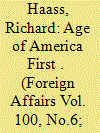

|
|
|
|
|
| Summary/Abstract |
Donald Trump was supposed to be an aberration—a U.S. president whose foreign policy marked a sharp but temporary
break from an internationalism that had de!ned seven decades ofU.S. interactions with the world. He saw little value in alliances and spurned multilateral institutions. He eagerly withdrew
from existing international agreements, such as the Paris climate accord and the 2015 Iran nuclear deal, and backed away from new ones,
such as the Trans-Paci!c Partnership (TPP). He coddled autocrats and
trained his ire on the United States’ democratic partners.
|
|
|
|
|
|
|
|
|
|
|
|
|
|
|
|
| 2 |
ID:
170043
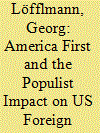

|
|
|
|
|
| Summary/Abstract |
Trump's foreign policy does not spell the end of the liberal international order but does challenge the notion that liberal hegemony lacks a legitimate alternative.
|
|
|
|
|
|
|
|
|
|
|
|
|
|
|
|
| 3 |
ID:
163042
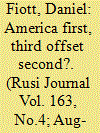

|
|
|
|
|
| Summary/Abstract |
In 2014, the US Department of Defense announced that it would embark on a new defence innovation initiative termed the ‘Third Offset Strategy’. This Obama-era strategy was conceived to overcome the perceived military-technological rise of states such as China, Russia, Iran and North Korea. Since the election of President Donald Trump, however, questions about the continued relevance of the Third Offset Strategy have emerged. Daniel Fiott considers the factors that are driving forward defence innovation efforts in the US under the current administration, and the challenges of doing so.
|
|
|
|
|
|
|
|
|
|
|
|
|
|
|
|
| 4 |
ID:
162001
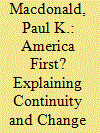

|
|
|
|
|
| Summary/Abstract |
PAUL K. MACDONALD examines shifts in American foreign policy during the first year of Donald Trump’s presidency. He finds that Trump has not disrupted American foreign policy as dramatically as he promised, and that his choices appear driven more by domestic and bureaucratic politics than an overarching vision.
|
|
|
|
|
|
|
|
|
|
|
|
|
|
|
|
| 5 |
ID:
158863
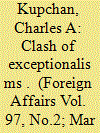

|
|
|
|
|
| Summary/Abstract |
Many Americans have recoiled at President Donald Trump’s “America first” foreign policy. [1] Critics charge that his populist brand of statecraft undermines the United States’ role [2]as an exceptional nation [2] destined to bring political and economic liberty to a waiting world. Trump exhibits isolationist, unilateralist, and protectionist instincts; indifference to the promotion of democracy; and animosity toward immigrants. How could Americans elect a president so at odds with what their country stands for?
|
|
|
|
|
|
|
|
|
|
|
|
|
|
|
|
| 6 |
ID:
173032
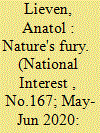

|
|
|
|
|
| Summary/Abstract |
The challenge for U.S. and Western politicians in meeting the short-term crisis of the coronavirus and the long-term crisis of climate change is to create, by democratic means, the sort of national consensus that will make radical and consistent strategies possible.
|
|
|
|
|
|
|
|
|
|
|
|
|
|
|
|
| 7 |
ID:
152150
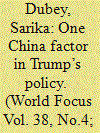

|
|
|
|
|
| Summary/Abstract |
After assuming the office as 45th President of America on Jan 20, 2017 Donald Trump has released his policy named ‘America First’ Foreign Policy focussed on protected free Market for Americans and Restore the American dream and given slogan Buy American, Hire American. On China he has loose - tight (flip-flopped) policy, sounding tough on trade but blinking on the one China approach that he initially questioned.
|
|
|
|
|
|
|
|
|
|
|
|
|
|
|
|
| 8 |
ID:
152145
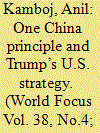

|
|
|
|
|
| Summary/Abstract |
In Asia, structural constraints are proving too formidable to articulate an alternative response to rapidly evolving regional realities. But it’s not readily evident if this is sustainable in the long term, given the strong views of the US President and his inner team. Now, Trump is encountering the limits of presidential power, much like his predecessors. A President committed to putting “America first” now seems to recognize that a framework through which countries can pursue shared goals is not a bad thing.
|
|
|
|
|
|
|
|
|
|
|
|
|
|
|
|
| 9 |
ID:
177995


|
|
|
|
|
| Summary/Abstract |
What are the coping strategies of small states at a time when their great power ally questions its security guarantees? Faced with such a scenario, one strand of the literature proposes that small states will seek to establish a reputation of a “good ally” in the eyes of their security patron, thus reducing the likelihood of abandonment. Others, however, maintain that in times of heightened geopolitical uncertainty, small states will attempt to “hedge their bets” by reducing their reliance upon a capricious great power and pursue strategic realignment. The article tests these theoretical assumptions against NATO’s easternmost members: Estonia, Latvia, and Lithuania and their navigation of the “America First” world. The analysis lends evidence that the Baltics have not sought a strategic reorientation away from Washington. Instead, to guard against the possibility of their patron’s defection, they have strived to gain a loyal and trustworthy partner’s reputation by increasing their defence spending and joining the US on a foreign battlefield. The study concludes that these efforts have been primarily geared towards an audience of one: a NATO-sceptic US President.
|
|
|
|
|
|
|
|
|
|
|
|
|
|
|
|
| 10 |
ID:
162396
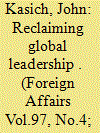

|
|
|
| 11 |
ID:
155900
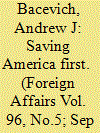

|
|
|
| 12 |
ID:
172737
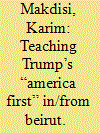

|
|
|
| 13 |
ID:
160946
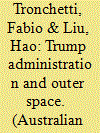

|
|
|
|
|
| Summary/Abstract |
In a relatively short period of time, the Trump administration has been fairly active in the field of space. The reconstitution of the National Space Council, under the direction of Vice President Pence, the President’s signing of Space Policy Directive 1, that calls for the return of humans to the Moon, and the announcement of a National Space Strategy that calls for an ‘America first’ approach in space, have been the highlights of this process. A key component of the administration’s approach has been the promotion of commercial (private) space activities through an effort of regulatory reform intended to facilitate free enterprise and individual initiative in space.
Overall, it is evident that the Trump administration views a consolidated US leadership in space as instrumental to ‘Make America Great Again’. However, due to the lack of cohesion in the management of the US space program, the controversial interpretation of international principles and the US-centred view of space endorsed by the administration, doubts remain as to whether the space policy of the Trump administration will foster US leadership in space or lead to its progressive isolation.
|
|
|
|
|
|
|
|
|
|
|
|
|
|
|
|
| 14 |
ID:
170869
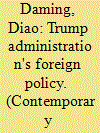

|
|
|
| 15 |
ID:
164308
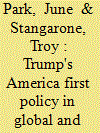

|
|
|
|
|
| Summary/Abstract |
Since the end of World War II, the United States has played a leading role in shaping the global economic system. While US influence has waned with the reconstruction of Europe and the rise of China, it has remained the leading power in the international system. The election of Donald Trump, however, represents a significant shift in US trade policy. In its first days the Trump administration withdrew from the Trans-Pacific Partnership and has since taken specific steps to renegotiate trade agreements and protect US industries. Politicizing the importance to reduce bilateral US trade deficits and to bring manufacturing jobs back home, the Trump administration has also utilized trade remedies in addition to the seldom-used safeguards to advance its "America First" economic agenda. Although trade remedy actions—the imposition of antidumping and countervailing duty based on the US Trade Act of 1974—have been critical instruments for US trade, prioritizing trade deficit reduction in US trade policy has the potential to erode the underlying international system and exacerbate rather than resolve the tensions that have spurred nationalistic economic movements. Against this backdrop, in this article we explore the implications of an abrogation of US global economic leadership for the international trading system and US influence more broadly. We also consider the implications for East Asia and the global economy as a whole as China, the European Union, and Japan take on larger leadership roles within the global trading system.
|
|
|
|
|
|
|
|
|
|
|
|
|
|
|
|
| 16 |
ID:
162428
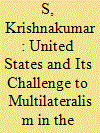

|
|
|
|
|
| Summary/Abstract |
With Donald Trump as President of United States, multilateralism in the world economy is facing an unprecedented challenge. The international economic institutions that have evolved since the fifties are increasingly under the risk of being undermined. With the growing assertion of the emerging and developing economies in the international fora, United States is increasingly sceptical of its ability to maneuvre such institutions to suit its own purpose. This is particularly true with respect to WTO, based on “one country one vote” system. The tariff rate hikes initiated by the leader country in the recent past pose a serious challenge to the multilateral trading system. The paper tries to undertake a critical overview of the US pre-occupation of targeting economies on the basis of the bilateral merchandise trade surpluses of countries, through the trade legislations like Omnibus Act and Trade Facilitation Act. These legislations not only ignore the growing share of the United States in the growing invisibles trade in the world economy, but also read too much into the bilateral trade surpluses of economies with United States and the intervention done by them in the foreign exchange market.
|
|
|
|
|
|
|
|
|
|
|
|
|
|
|
|